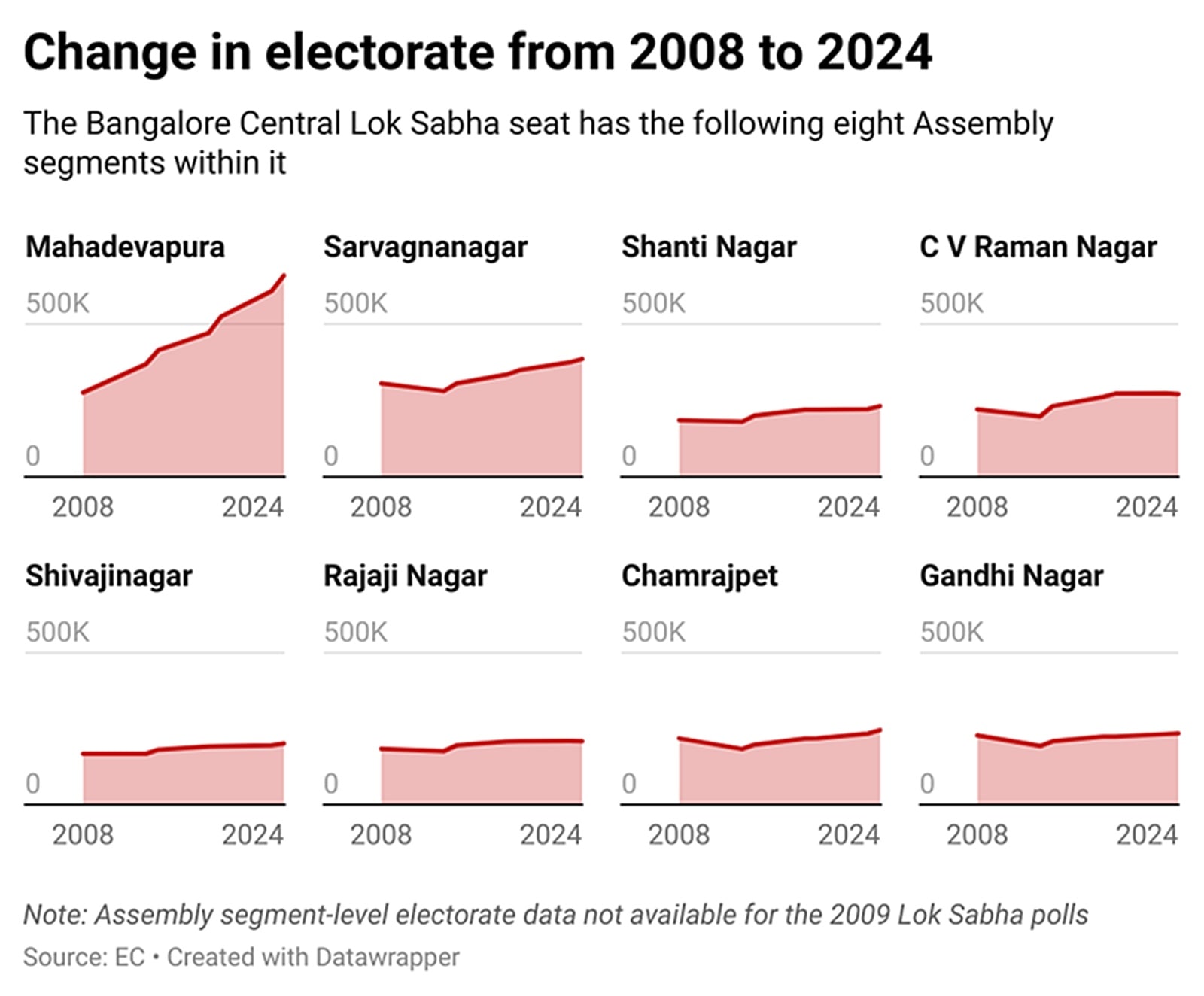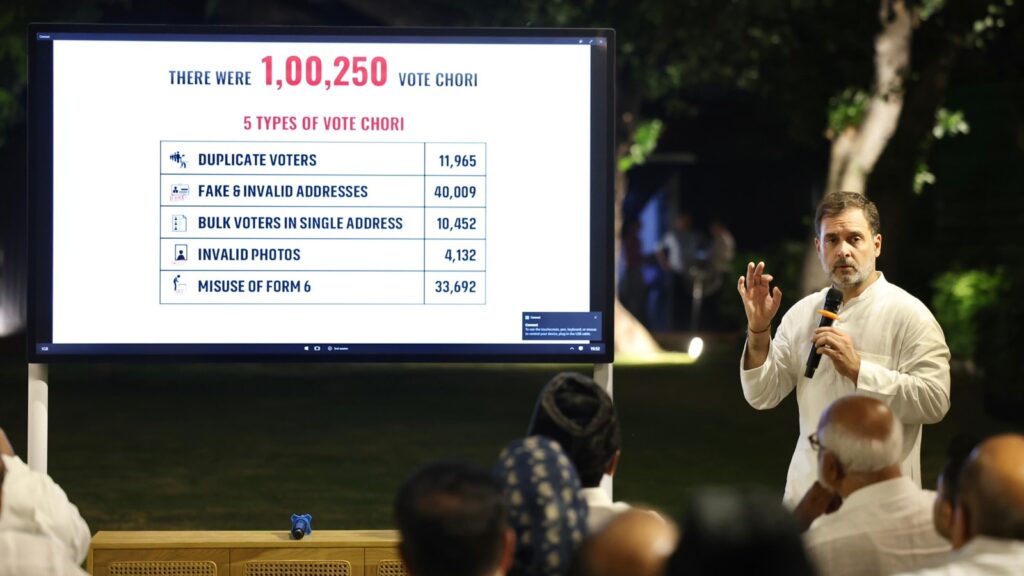Keeping his guns trained at the Election Commission (EC), Leader of the Opposition (LoP) in the Lok Sabha Raul Gandhi has released what he described as an “atom bomb” of evidence showing, he alleged, that the poll body had “stolen votes” for the BJP in Karnataka’s Mahadevapura Assembly segment, which falls under the Bangalore Central parliamentary constituency, in the 2024 Lok Sabha elections.
In a presentation to the media at the All India Congress Committee (AICC) headquarters in Delhi Thursday, Gandhi claimed the Congress won all the Assembly segments in Bangalore Central except Mahadevapura and lost the election by 1,14,046 votes.
“So, we started looking at this number. Why is it that this (1,14,046) comes out of one seat? It is a huge imbalance. So, we started looking at Mahadevapura, the details. And we found that 1,00,250 votes were stolen. Out of 6.5 lakh total votes in the Assembly, 1,00,250 votes were stolen,” Gandhi alleged. “They were stolen in five different ways: duplicate voters, fake and invalid addresses, bulk voters in a single address, invalid photos, and misuse of Form 6, which is given to first-time voters for enrolment.”
Since 2008, when the Mahadevapura Assembly constituency was created, the seat has been won by the BJP in four consecutive elections, as has the larger Bangalore Central Lok Sabha seat, with the Congress finishing as the runner-up every time. But Mahadevapura has seen its electorate grow at a significantly faster rate as compared to the other seven Assembly segments in the Bangalore Central Lok Sabha seat.
Bangalore Central’s electorate
The Mahadevapura Assembly seat was created in the 2008 delimitation exercise that redrew constituency boundaries.
Since its creation, the size of Mahadevapura’s electorate has grown from 2.75 lakh in the 2008 Assembly elections to 6.6 lakh in the 2024 Lok Sabha polls, an increase of 140%. In contrast, the Assembly segment in Bangalore Central with the next highest increase in its electorate was Sarvagnanagar, which grew from 3.05 lakh in 2008 to 3.86 lakh in 2024 – an increase of just 26.5%.
The growth rate of the electorate in the other Assembly segments in Bangalore Central more closely aligns with that of Sarvagnanagar, not Mahadevapura – Shanti Nagar’s electorate grew by 25.2% from 2008 to 2024, C V Raman Nagar by 23.1%, Shivajinagar by 19.8%, Rajaji Nagar by 13.7%, Chamrajpet by 12.6%, and Gandhi Nagar by 3%.
 Change in electorate from 2008 to 2024
Change in electorate from 2008 to 2024
Even before it came into existence as an Assembly constituency, Mahadevapura was a hotbed of unregulated real estate development through the conversion of agricultural land into prime real estate that had become increasingly unavailable in the heart of Bengaluru following the tech boom in the early 2000s. For new migrants, the Mahadevapura region has provided affordable housing and living needs in the last two decades.
As of the 2024 Lok Sabha polls, the Mahadevapura Assembly segment has by far the largest electorate, almost twice the size of the next largest Sarvagnanagar seat. In 2008, it was Sarvagnanagar that had the largest electorate.
While urban seats generally see lower voter turnouts than others, the Mahadevapura seat has consistently seen high turnouts in Assembly elections compared to the other segments in the Bangalore Central Lok Sabha seat. From the 2008 Assembly polls to the 2018 polls, Mahadevapura had the highest turnout among the eight Bangalore Central segments — peaking at 61.6% in 2013. In 2023, though, it had the fourth highest turnout at 55%. However, in the Lok Sabha polls, Mahadevapura went from seeing the second-highest turnout — 58% — among the Bangalore Central segments in 2014 to only the sixth highest — 54% — in 2024.
But the large size of Mahadevapura’s electorate is such that it has seen the highest absolute number of voters in each Assembly and Lok Sabha election since 2008, among the Assembly segments within Bangalore Central.
Mahadevapura segment in LS, Assembly polls
In the Lok Sabha and Assembly elections, both in the Mahadevapura segment and the larger Bangalore Central seat, the BJP has been the dominant party.
The Bangalore Central seat has been won by the BJP’s P C Mohan in each of the last four Lok Sabha elections since 2009. The BJP has also led in the Mahadevapura Assembly segment consecutively from the 2009 to 2024 Lok Sabha polls.
In the 2009 Lok Sabha polls, the BJP led in five of the eight Assembly constituencies under Bangalore Central, with the Congress leading in two segments and the Janata Dal (Secular) in one. In 2014, the BJP repeated its performance of 2009 to lead in five segments, with the Congress leading in the remaining three. But in 2019 and 2024, the BJP and Congress each led in four segments.
Over the last four Lok Sabha polls, the Scheduled Castes (SCs)-reserved Mahadevapura is the only segment under Bangalore Central where the BJP’s vote share has risen in each election — from 45.6% in 2009 to 64.7% in 2024. In every other segment in this parliamentary constituency, the BJP’s vote shares have fluctuated from election to election.
The Congress, on the other hand, saw its vote share rise in each of the last four Lok Sabha polls in four Assembly segments under Bangalore Central. Three of these segments have sizeable Muslim populations – 43.8% in Chamrajpet, 38.3% in Shivajinagar, and 32.1% in Sarvagnanagar, as per disaggregated Census 2011 data. In Mahadevapura, its vote share fell between 2009 and 2014, before rising marginally in 2019 and declining to its lowest ever in 2024.
In Mahadevapura, the BJP has won in four consecutive Assembly elections since the seat was created — by former state minister Aravind Limbavali in 2008, 2013 and 2018, and by his wife Manjula S in 2023.
In contrast to the Lok Sabha polls, the Mahadevapura Assembly seat has seen the BJP’s vote shares fluctuate over the years, with the party recording its highest vote share in 2023 at 54.3%. The BJP’s highest winning margin, at 44,501 votes, also came in 2023. The Congress has finished as the runner-up in the seat in each of the last four Assembly polls, registering its highest vote share in 2013 at 45.9%.

